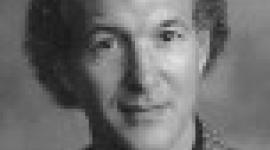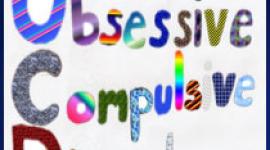Obsessive Compulsive Disorder OCD Medications and Therapy

![]()
Dr. Alan Peck has been working with OCD patients for over 20 years. He participated in the transition from therapy-only treatment to the addition of OCD medications. Dr. Peck helped bring the first drug that was authorized for Obsessive-Compulsive Disorder, Anafranil, into the U.S. in 1980.
David Roberts is the HealthyPlace.com moderator.
The people in blue are audience members.
David: Good Evening. I'm David Roberts. I'm the moderator for tonight's conference. I want to welcome everyone to HealthyPlace.com. Our topic tonight is OCD (Obsessive-Compulsive Disorder). Our guest is psychiatrist Alan Peck.
Dr. Peck has been working with OCD patients for over 20 years and has participated in the transition from mostly therapy-only treatment for Obsessive-Compulsive Disorder to the addition of a number of medications that provide relief. In fact, Dr. Peck helped bring the first authorized drug for OCD to this country, Anafranil (Clomipramine), nearly 20 years ago.
Good evening Dr. Peck and welcome to HealthyPlace.com. Thank you for being our guest tonight. You call Obsessive-Compulsive Disorder one of the most emotionally painful psychological problems that exist. What makes that so?
Dr. Peck: The continual and usually bothersome thoughts in the obsessional mode is painful. The compulsive aspect, although not as common, can be life-limiting.
David: What are the most effective treatments for OCD?
Dr. Peck: Obsessive thoughts are usually foreign in nature and can be often opposite to what a person wants to feel. I believe medication is the most effective treatment. Cognitive therapy is helpful as well, in that it can educate a person to understand his/her disease.
David: And which OCD medications are we talking about? Can you mention them by name?
Dr. Peck: Probably the most effective medication is Anafranil (Clomipramine)--or clomipramine. Many of the SSRI medications or new generation of antidepressants are helpful such as Prozac, Zoloft, Paxil, etc. Luvox is the SSRI that has been authorized by the FDA as the accepted SSRI for OCD but all, I feel, are useful.
Other drugs may be helpful as well . For example, an anti-anxiety drug, such as Xanax, could control the anxiety caused by bothersome thoughts.
David: Do you think that OCD can be effectively treated by therapy only, without medications?
Dr. Peck: Perhaps a mild case but when there is emotional pain, medications are necessary.
David: And how about vice versa? The medications without the therapy? Is that effective?
Dr. Peck: Yes, but after an understanding of the patient occurs. Then medications may suffice.
David: Here are some audience questions, Dr. Peck:
Chris10: I've been on Luvox, Prozac, Celexa, and none of them worked. Now, I just started Zoloft. Is it unusual to have a hard time finding a medication that works for you?
Dr. Peck: Yes, it can be a difficult time. I would urge a trial of Anafranil.
Chris10: My doctor won't put me on Anafranil. He says there are too many side-effects. Is that true?
Dr. Peck: That is not true. For some reason, at least in my practice, side-effects in OCD patients have not been a serious problem. Perhaps the relief from Anafranil hides the side-effects.
David: For a more detailed look at the various OCD medications, their effects and side-effects, you can for our medications chart.
LexuskelA: I would like to ask a question about medications for OCD that do NOT involve side effects of throwing up or nausea. I have a HUGE fear of throwing up and I have decided to go on medications. I want to know what ones are best.
Dr. Peck: Of the SSRI medications, Celexa appears to have the least side effects, next would be Luvox and then Serzone.
megstar: How many different types of OCD (Obsessive-Compulsive Disorder) are there?
Dr. Peck: Interesting question. I think there are many types. The true classic type of obsessions and compulsions are not that common. At least 25% of people who are obsessional, do not have any compulsions. Then, there are degrees of this.
David: Are there factors, such as smoking, drinking, stress, etc., that enhance the effects of OCD?
Dr. Peck: OCD was first thought of as a type of anxiety problem. In later years, it was believed to be somehow connected with depression. I believe anxiety is involved here. And then stress, drink and smoking, I believe, affect anxiety levels and hence OCD.
I believe too, that many problems such as OCD, can be environmental. Living with someone with OCD can become the theme of the family. Getting away from it may help.
David: And that's a good point Dr. Peck. How can friends and family members help OCD sufferers, or is it really something they have to handle on their own?
Dr. Peck: If you trust your family or loved one, then they can help by gently encouraging you to not be as intense, to remind you that you are showing signs of OCD.
mitcl: Are obsessions tougher to cure than compulsions? I only have the obsessions and I am curious.
David: And also, please explain what is the difference between obsessions and compulsions?
Dr. Peck: An obsession is a thought and a compulsion is an act.
I think compulsions are easier to work with in therapy. A behavior approach can be useful. The compulsions may be more understandable than the obsessions.
Starfish: Does OCD ever go away?
Dr. Peck: I believe obsessions and compulsions can be diminished, and with medication, in some people, they can almost disappear or at least make life more comfortable.
ksd: Do certain medications cause lack of concentration?
Dr. Peck: I have not heard of medications decreasing concentration. Concentration itself can be obsessional and so, if the drug works, you may not be as intense and thus concentrate less.
tee: What about if you were on medications for a long time and then get off them. Is it possible for the OCD to go away without the medications?
Dr. Peck: I am not sure. If there has been successful therapy to understand the illness and its causes, then it may not return.
David: Have you ever seen cases, Dr. Peck, where there is a "complete recovery;" where none of the OCD symptoms return?
Dr. Peck: In recent years, OCD has been considered a brain chemical problem. I am still of the old school and believe it is a mechanism for the person to hide a deeper feeling such as anger or even rage. Dealing with the anger may dissipate the OCD. I have a patient who yesterday returned with panic and anger about her mother and an abusive brother who is on heroin. The rage is frightening her but no complaint of obsessions--at least not yesterday.
David: So everyone knows, we do have an OCD screening test on our site.
lmoore: I am having sexual side-effects from Paxil and cannot achieve an orgasm. What would you suggest?
Dr. Peck: Paxil has the most sexual side-effects of SSRI medications. It is a great drug but this is a problem. There have been suggestions of adding other medications to help. Not taking it that day is a possibility or cutting back the dose or taking it after sex. Paxil should not be stopped for too long because there can be a discontinuation syndrome.
mitcl: If you've only had the obsessions a short period of time, can they be easier to control than if I've had them for a long time?
Dr. Peck: I would believe so. Although many people with obsessions probably don't talk about them for a long time.
cargirl: I have a teenager who doesn't believe he has Obsessive-Compulsive Disorder & therefore "forgets" to take his medication. What can I do to help him understand that he needs his OCD medication?
Dr. Peck: Don't let him forget. It is too important. And it will make your life more pleasant.
tee: Can the medicines possibly cause short-term memory loss or forgetfulness?
Dr. Peck: I have not seen this as a problem. Perhaps the obsessions can keep a person preoccupied.
David: I'm getting some questions about the side-effects of various medications. For a more detailed look at the various OCD medications, their effects and side-effects, you can visit our medications chart.
krajo3: Can OCD medications cause other mental health problems such as depression and suicidal thoughts?
Dr. Peck: This is an important question. OCD is caused by some change in brain chemistry--perhaps with serotonin and norepinephrine. Anafranil works on both systems. I believe Serotonin plays a major role here. The SSRI medications affect serotonin so they may possibly increase obsessions. I had a lawyer for a patient who was depressed and placed on Prozac. Songs began to float through his mind, even in the courtroom, to the point that he could not concentrate. This too, is a form of obsessional thoughts. Suicidal thoughts can occur after SSRI introduction, almost itself as an obsessional thought pattern.
Sylvie: Are petite mal seizures or any other brain disorders the cause of OCD? I have this, and also what I call "compulsive creativity" although, after 7 years of nonstop driven creativity, I am better now.
Dr. Peck: I am not certain about Petit mal, but I do believe that brain disorders may be one cause of OCD. OCD in moderation is a part of life. People pick occupations because of it. My best friend in Medical School became a radiologist--a great one. Because of his his Obsessive-Compulsive Disorder qualities, I would want him to read my x-ray.
We B 100: I do some weird things such as when I do my homework, I have to write or type it in 4 different colors and always the same order, red, purple, blue, green. If I do not do this, I become very anxious. Could this be a sign of a type of OCD?
Dr. Peck: I believe so--and you support my contention that anxiety can be the basis of OCD.
David: Is there a genetic link to OCD? Do sufferers have to be concerned with the potential problem of passing OCD onto their offspring?
Dr. Peck: I have trouble with the questions of genetics in mental illness. But who am I to say it is not involved. I DO BELIEVE environment is important in mental illness. A mother with OCD or depression may not even realize she has it and may pass this on to her offspring. A parent may feel their obsessional thought is the way to live, and may encourage their children to follow this belief.
David: Do the OCD symptoms become less or more intense with age?
Dr. Peck: I think OCD is more painful in the earlier years -adolescence and young adult. It may continue through old age, but the person may learn how to deal with it more effectively.
Starfish: Dr Peck, I get thoughts stuck in my head, I repeat thoughts over and over, about nothing in particular. Is that considered an obsession?
Dr. Peck: I believe it is.
Ziglen: What would you suggest to someone for whom the OCD medications do not work, and for whom CBT has been refused because their problems are "too long-standing, too deep rooted and too extensive" and told to come back for reassessment after 5 or 10 years of psychotherapy? I live in torment daily and cannot work or get on with my life.
Dr. Peck: Have all OCD medications been tried --even those for anxiety?
Ziglen: Yes, but my General Practitioner won't give me any tranquillizers now due to addiction problems.
Dr. Peck: I have patients who are addicts. They are self-medicating due to their painful and intrusive thoughts. I will give them tranquilizers because they need them, but I will insist they take them as prescribed and this usually works.
lorianne: I have been on Luvox for about 9 months, beginning at 50mg and progressing to 200 mg gradually. I have found it somewhat helpful, but I still "skin pick" quite a bit. I am selling my business, moving away and planning to re-marry. I am under great stress and anxiety around all of that. Is there another drug I might try that might be more suitable? My internist is very open to suggestions about this. And would it be instead of or in addition to the Luvox?
Dr. Peck: If Luvox works, I would keep on it. But another medication in addition would be helpful. I hear anxiety from you with all the changes, so an anti-anxiety medication might be my first choice here.
Carolyn: If OCD comes from a "deeper source" as you say it does...then how do you explain how the SSRI's and Anafranil work? Wouldn't OCD have to originate from a brain chemical imbalance then?
Dr. Peck: I believe that the trauma of some sort is the cause of psychiatric conditions including Obessive-Compulsive Disorder. Once it occurs (often in childhood), it causes a change in brain chemistry, thus the drugs are needed for this chemical change which remains until treated.
Starfish: Do you think that hormone changes after childbirth or menstruation affect OCD?
Dr. Peck: I believe if you are prone to OCD, after a body change such as menstruation, you have a better chance of getting it or any emotional problem you might have.
bbal7: I started getting obsessive thoughts at around 14yrs old. I don't do the rituals, but have the scary thoughts. It got really bad when I had my daughter but Zoloft has helped me, I believe. If I have another child, what are my chances of getting postpartum OCD and depression again? I still get the thought that I will "lose control and just kill myself". Especially when I am tired or stressed out.
Dr. Peck: You just don't know if it will reoccur with the next birth. If you are prepared, you are better off.
7sparrows: My son is ten and has OCD. He also shows all the classic symptoms of ADD (Attention Deficit Disorder). We tried treating him with Ritalin, and he really went crazy! Everything got much worse. We took him off the Ritalin and he calmed down. My question is, can Obsessive-Compulsive Disorder have similar symptoms to ADD and be misdiagnosed?
Dr. Peck: I believe it can. Have you tried Adderall? Or even a drug for anxiety. There is also a new drug--Zyprexia which I find works well for a number of problems.
lmoore: Have you ever heard of using Ultram for OCD? I have spoken personally with Dr. Nathan Shapira who is currently running a clinical trial for the use of Ultram for OCD. It seems some people are opiate sensitive and respond very well to this drug. I understand its main effects are serotonergic and norepinephrine. I am a resident in anesthesiology and have tried Ultram on my own with very successful results. What are your thoughts?
Dr. Peck: Interesting comment. A number of patients in great "pain" like the narcotics because it relieves intrusive thoughts. Obviously it creates other problems.
DamagedPsyche: How do you feel about behavioral therapy opposed to cognitive therapy for OCD?
Dr. Peck: I like the concept of cognitive therapy. It teaches a person about themselves. Behavior therapy exposes one to this problems. Many illnesses are intertwined. In Post Traumatic Stress Disorder (PTSD) behavior therapy is suggested but I feel it terrifies the patient more. There is a primitive brake-in in all of us and that is where mental illness occurs. We don't need to stress it any more.
LexuskelA: I don't remember always being like this- can OCD pop up in your life at any time?
Dr. Peck: It probably is always there, and when it pops up, it may be a defensive mechanism or you may suddenly may be bored and thus feel vulnerable.
madi: My OCD has reached points in my life where it was extreme, and then it backs off for a while. Is this normal?
Dr. Peck: It seems to be, and you have had it long enough to learn how to live with it more effectively.
David: I know it's getting late. I want to thank Dr. Peck for being our guest tonight. I also want to thank everyone in the audience for coming and participating tonight. I hope you found it helpful.
Thank you again, Dr. Peck, for coming and answering so many questions.
Dr. Peck: My pleasure. I hope I was of help.
David: You were. Good night everyone.
Disclaimer: We are not recommending or endorsing any of the suggestions of our guest. In fact, we strongly encourage you to talk over any therapies, remedies or suggestions with your doctor BEFORE you implement them or make any changes in your treatment.
APA Reference
Gluck, S.
(2007, February 24). Obsessive Compulsive Disorder OCD Medications and Therapy, HealthyPlace. Retrieved
on 2024, June 20 from https://www.healthyplace.com/anxiety-panic/transcripts/obsessive-compulsive-disorder-ocd-medications-and-therapy



